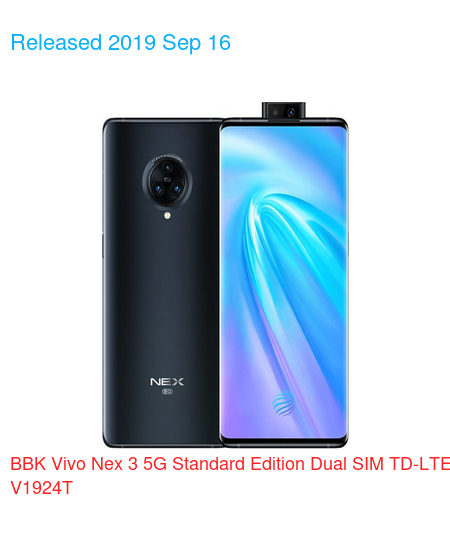| Brand | BBK |
| Model | Vivo Nex 3 5G Standard Edition Dual SIM TD-LTE CN 256GB V1924T |
| Released | 2019 Sep 16 |
| Announced | 2019 Sep 3 |
| Hardware Designer | BBK Electronics |
| Manufacturer | BBK Electronics |
| Codename | BBK V1924 |
| General Extras | Haptic touch feedback , Tactile touch feedback |
| Device Category | Smartphone |
| Width | 76.14 mm |
| Height | 167.44 mm |
| Depth | 9.4 mm |
| Dimensions | 3.00×6.59×0.37 inches |
| Mass | 218.5 g |
| Platform | Android |
| Operating System | Google Android 9.0 (Pie) |
| Software Extras | Voice Command , Navigation software , Augmented Reality (AR) , Intelligent personal assistant , Face Recognition |
| CPU Clock | 2956 MHz |
| CPU | Qualcomm Snapdragon 855+ SM8150-AC (Hana), 2019, 64 bit, octa-core, 64 Kbyte I-Cache, 64 Kbyte D-Cache, 1792 Kbyte L2, 2048 Kbyte L3, 7 nm, Qualcomm Adreno 640 GPU |
| RAM Type | LPDDR4x SDRAM |
| RAM Capacity (converted) | 8 GiB RAM |
| Non-volatile Memory Interface | Yes |
| Non-volatile Memory Capacity (converted) | 256 GB ROM |
| Display Diagonal | 175 mm |
| Resolution | 1080×2256 |
| Horizontal Full Bezel Width | 0.58 mm |
| Display Area Utilization | 93.6% |
| Pixel Density | 363 PPI |
| Display Type | AM-OLED display |
| Display Subtype | Super AM-OLED |
| Number of Display Scales | 16.8M |
| Scratch Resistant Screen | Yes |
| Graphical Controller | Qualcomm Adreno 640 |
| GPU Clock: | 672 MHz |
| A/V Out | No |
| Audio Controller | Asahi Kasei AK4377A |
| Microphone(s) | stereo |
| Loudspeaker(s): | mono |
| Audio Output: | 3.5mm |
| Supported Cellular Bands | GSM850 , GSM900 , GSM1800 , GSM1900 , UMTS2100 (B1) , UMTS1900 (B2) , UMTS1700/2100 (B4) , UMTS850 (B5) , UMTS900 (B8) , TD-SCDMA2000 , TD-SCDMA1900 , LTE2100 (B1) , LTE1900 (B2) , LTE1800 (B3) , LTE1700/2100 (B4) , LTE850 (B5) , LTE2600 (B7) , LTE900 (B8) , LTE700 (B12) , LTE700 (B17) , LTE800 (B18) , LTE800 (B19) , LTE800 (B20) , LTE850 (B26) , LTE700 (B28) , TD-LTE2000 (B34) , TD-LTE2600 (B38) , TD-LTE1900 (B39) , TD-LTE2300 (B40) , TD-LTE2500 (B41) , TD-NR2500 (N41) , TD-NR3500 (N78) bands |
| Supported Cellular Data Links | GPRS , EDGE , UMTS , HSUPA , HSUPA 5.8 , HSDPA , HSPA+ 21.1 , HSPA+ 42.2 , DC-HSDPA 42.2 , TD-SCDMA , TD-HSDPA , LTE , LTE 100/50 , LTE 150/50 , LTE 300/50 , LTE 600/50 , LTE 1000/100 , LTE 1200/200 data links |
| SIM Card Slot | Nano-SIM (4FF) |
| Complementary Phone Services | Voice transmission , Voice speaker , Vibrate , Speakerphone , ANC , HD Voice , VoLTE |
| Dual Cellular Network Operation | Dual standby |
| Sec. Supported Cellular Networks: | GSM850 , GSM900 , GSM1800 , GSM1900 , UMTS2100 (B1) , UMTS1900 (B2) , UMTS1700/2100 (B4) , UMTS850 (B5) , UMTS900 (B8) , CDMA1900 (BC1/BC14) , TD-SCDMA2000 , TD-SCDMA1900 , LTE2100 (B1) , LTE1900 (B2) , LTE1800 (B3) , LTE1700/2100 (B4) , LTE850 (B5) , LTE2600 (B7) , LTE900 (B8) , LTE700 (B12) , LTE700 (B17) , LTE800 (B18) , LTE800 (B19) , LTE800 (B20) , LTE850 (B26) , LTE700 (B28) , TD-LTE2000 (B34) , TD-LTE2600 (B38) , TD-LTE1900 (B39) , TD-LTE2300 (B40) , TD-LTE2500 (B41) |
| Sec. Supported Cellular Data Links: | GPRS , EDGE , UMTS , HSUPA , HSUPA 5.8 , HSDPA , HSPA+ 42.2 , DC-HSDPA 42.2 , TD-SCDMA , TD-HSDPA , LTE , LTE 100/50 , LTE 150/50 , LTE 300/50 , LTE 600/50 , LTE 1000/100 , LTE 1200/200 |
| Sec. SIM Card Slot | Nano-SIM (4FF) |
| Touchscreen Type | Capacitive multi-touch screen |
| Expansion Interfaces | No |
| USB | USB 2.0 |
| USB Services | USB charging , USB fast charging , USB Host , USB OTG 1.3 , USB OTG 2.0 , USB PD |
| USB Connector | USB C reversible |
| Max. Charging Power | 44.0 W |
| Bluetooth | Bluetooth 5.0 |
| Wireless LAN | 802.11a , 802.11b , 802.11g , 802.11n , 802.11ac |
| Wireless Services | Wi-Fi Direct , Wi-Fi Tethering , WiDi , Wi-Fi Calling |
| NFC | NFC A , NFC B |
| FM Radio Receiver | No |
| Complementary Satellite Services | Simultaneous GPS , A-GPS , Geotagging , QuickGPS , QZSS |
| Supported GLONASS protocol(s) | L1OF |
| Supported Galileo service(s) | E1 |
| Supported BeiDou system (BDS) | B1I BeiDou receiver |
| Camera Placement | Rear |
| Camera Image Sensor | BSI CMOS |
| Image Sensor Pixel Size | 0.80 micrometer |
| Number of effective pixels | 64.4 MP camera |
| Aperture (W) | f/1.80 |
| Zoom | 2.0 x optical zoom |
| Focus | PD AF |
| Video Recording | 3840×2160 pixel |
| Flash | single LED |
| Camera Extra Functions | EIS (video) , Pixel unification , HDR photo , HDR video , Red-eye reduction , Slow motion video , Burst mode , Refocus , Touch focus , Panorama Photo , Face detection , Face tagging , Smile detection , Face retouch , Face retouch (video) , Intelligent scene detection |
| Aux. Camera Image Sensor | BSI CMOS |
| Aux. Camera Number of Pixels | 13.0 MP aux. cam |
| Aux. Camera Aperture (W) | f/2.20 |
| Aux. Cam. Min. Equiv. Focal Length | 16 mm |
| Aux. Camera Focus | PD AF |
| Aux. Camera Extra Functions | HDR photo , HDR video , Burst mode , Macro mode , Panorama Photo , Face detection , Face tagging , Smile detection |
| Aux. 2 Camera Image Sensor | BSI CMOS |
| Aux. 2 Camera Number of Pixels | 13.0 MP aux. 2 cam |
| Aux. 2 Camera Aperture (W) | f/2.48 |
| Aux. 2 Cam. Min. Equiv. Focal Length | 52 mm |
| Aux. 3 Camera Image Sensor | No |
| Aux. 4 Camera Image Sensor | No |
| Secondary Camera Placement | Slide-out |
| Secondary Camera Sensor | BSI CMOS |
| Secondary Camera Number of pixels | 15.9 MP sec. cam |
| Secondary Aperture (W) | f/2.09 |
| Secondary Video Recording | 1920×1080 pixel |
| Sec. Built-in Flash | single LED |
| Secondary Camera Extra Functions | HDR photo , HDR video , Burst mode , Panorama Photo , Face detection , Face tagging , Smile detection , Face retouch , Face retouch (video) , Intelligent scene detection |
| Sec. Aux. Cam. Image Sensor | No |
| Built-in compass | Yes |
| Built-in accelerometer | 3D accelerometer |
| Built-in gyroscope | 3D gyro |
| Additional sensors | In-screen FP sensor , L sensor , P sensor |
| Protection from solid materials | Yes |
| Protection from liquids | Yes |
| Battery | Li-ion polymer (LiPo) |
| Nominal Battery Capacity | 4500 mAh battery |
| Market Countries | China |
| Market Regions | Asia |
| Mobile Operator | China Mobile Limited |
| Added | 2024-06-15 |
Specifications data description of this 📱BBK Vivo Nex 3 5G Standard Edition Dual SIM TD-LTE CN 256GB V1924T📱
Title: The Ultimate Specification Guide for Your Device 🌐📅🏋️🌈🤖🛠️🚀🔧💪🖥️🎮🧠🗂️📷🎥🔈📡📶💡🎁🔋🔌
Introduction:
Welcome, tech enthusiasts! Today, we’re diving deep into the specification of a device, exploring every detail from the network capabilities to the battery life. Whether you’re in the market for a new gadget or simply love learning about technology, buckle up and join us on this exciting journey!
Lineup:
This guide covers a wide range of specifications, allowing you to fully understand the capabilities and limitations of your device:
– 🌐 Network: Discover the device’s connectivity features, such as 4G, 5G, Wi-Fi, and Bluetooth technology.
– 📅 Launch: Learn about the release date, helping you determine the device’s age and its compatibility with the latest software.
– 🏋️ Body: Get familiar with the device’s dimensions, weight, and build materials, allowing you to make informed decisions when comparing devices.
– 🌈 Display: Delve into the device’s display specifications, including the screen size, resolution, and refresh rate.
– 🤖 OS: Uncover the device’s operating system and version, helping you understand the software’s capabilities and limitations.
– 🛠️ Chipset: Discover the device’s system-on-a-chip, defining its performance and efficiency.
– 🚀 CPU: Dive into the device’s central processing power, determining its ability to handle complex tasks and applications.
– 🔧 GPU: Reveal the device’s graphics processing capabilities, allowing you to assess its gaming and multimedia performance.
– 🧠 Memory: Explore the device’s random-access memory, impacting its multi-tasking performance and overall speed.
– 🗂️ Storage: Learn about the device’s internal and expandable storage options, ensuring you have enough space for apps, media, and files.
– 📷 Camera: Reveal the device’s camera specifications, such as the megapixel count, aperture, and additional features.
– 🎥 Video: Discover the device’s video recording capabilities, including frame rates, resolutions, and stabilization features.
– 🔈 Sound: Explore the device’s audio technology, including the number of speaker units, audio formats, and noise-canceling features.
– 📡 Connectivity: Dive into the device’s communication capabilities, including NFC, Infrared, and other advanced features.
– 📶 Network: Reveal the device’s mobile connectivity options, allowing you to compare network compatibility and performance.
– 💡 Features: Uncover the device’s unique features, such as water or dust resistance and biometric authentication.
– 🎁 Battery: Explore the device’s battery capacity, helping you determine its standby and talk time.
– 🔋 Charging: Discover the device’s charging technology, including wired, wireless, and fast-charging capabilities.
Design:
The device’s design encompasses many factors, including its appearance, dimensions, and build quality. Consider the following factors when evaluating your device’s design:
– Build materials: Is the device crafted from premium materials, including metals, glass, or a combination of both?
– Ergonomics: Is the device designed with comfort and practicality in mind?
– Display: Is the device’s display vivid, sharp, and smooth, providing an immersive viewing experience?
Specifications:
The specifications outlined above are only some of the many factors to consider when evaluating a device. By understanding these specifications, you can make a well-informed decision, ensuring the device meets your needs and suits your preferences.
Conclusion:
Tech specification guides are essential for anyone seeking to learn more about devices and their capabilities. With the knowledge gained from this blog post, you’ll be able to choose the perfect device, optimize its performance, and understand its limitations.
Now, we would love to hear from you, our valued readers! Don’t hesitate to leave a comment below, sharing your thoughts, insights, and opinions. We can’t wait to hear from you! 🌐📅🏋️🌈🤖🛠️🚀🔧💪🖥️🎮🧠🗂️📷🎥🔈📡📶💡🎁🔋🔌














